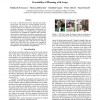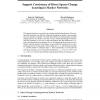61
Voted
AAAI
2015
9 years 9 months ago
2015
We create a unified framework for analyzing and synthesizing plans with loops for solving problems with nondeterministic numeric effects and a limited form of partial observabili...
58
Voted
AAAI
2015
9 years 9 months ago
2015
74
Voted
AAAI
2015
9 years 9 months ago
2015
ion for Solving Large Incomplete-Information Games Tuomas Sandholm Computer Science Department Carnegie Mellon University Most real-world games and many recreational games are gam...
64
Voted
AAAI
2015
9 years 9 months ago
2015
The interactions between covariates may change with learning domains. Discovering such transitions may offer key information helping us transfer our knowledge from one domain to a...
59
Voted
AAAI
2015
9 years 9 months ago
2015
The development and maintenance of large and complex ontologies are often time-consuming and error-prone. Thus, automated ontology learning and evolution have attracted intensive ...
62
Voted
AAAI
2015
9 years 9 months ago
2015
We study convergence properties of iterative voting procedures. Such a procedure is defined by a voting rule and a (restricted) iterative process, where at each step one agent ca...
64
Voted
AAAI
2015
9 years 9 months ago
2015
A scoring rule is a device for eliciting and assessing probabilistic forecasts from an agent. When dealing with continuous outcome spaces, and absent any prior insights into the s...
63
Voted
AAAI
2015
9 years 9 months ago
2015
Optimization via continuation method is a widely used approach for solving nonconvex minimization problems. While this method generally does not provide a global minimum, empirica...
55
Voted
AAAI
2015
9 years 9 months ago
2015
95
Voted
AAAI
2015
9 years 9 months ago
2015
This paper presents a novel approach to inductive process modeling, the task of constructing a quantitative account of dynamical behavior from time-series data and background know...


